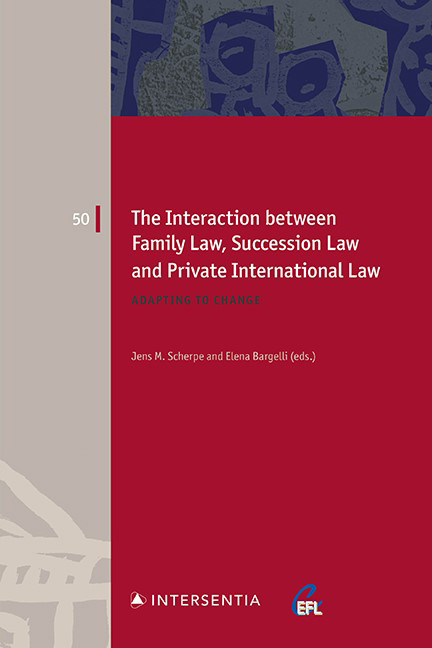Book contents
- Frontmatter
- Acknowledgements
- Contents
- List of Cases
- List of Contributors
- The Interaction between Family Law, Succession Law and Private International Law: An Introduction
- PART I THE IMPACT OF DEVELOPMENTS IN NATIONAL FAMILY LAWS ON EU PRIVATE INTERNATIONAL LAW
- PART II THE IMPACT OF EU PRIVATE INTERNATIONAL LAW ON NATIONAL FAMILY LAWS
- PART III THE IMPACT OF NATIONAL SUCCESSION LAWS ON EU PRIVATE INTERNATIONAL LAW
- PART IV THE IMPACT OF EU PRIVATE INTERNATIONAL LAW ON NATIONAL SUCCESSION LAWS
- Index
- European Family Law Series
Regulation (EU) 650/2012 and Territorial Conflicts of Laws in Spain
Published online by Cambridge University Press: 25 May 2021
- Frontmatter
- Acknowledgements
- Contents
- List of Cases
- List of Contributors
- The Interaction between Family Law, Succession Law and Private International Law: An Introduction
- PART I THE IMPACT OF DEVELOPMENTS IN NATIONAL FAMILY LAWS ON EU PRIVATE INTERNATIONAL LAW
- PART II THE IMPACT OF EU PRIVATE INTERNATIONAL LAW ON NATIONAL FAMILY LAWS
- PART III THE IMPACT OF NATIONAL SUCCESSION LAWS ON EU PRIVATE INTERNATIONAL LAW
- PART IV THE IMPACT OF EU PRIVATE INTERNATIONAL LAW ON NATIONAL SUCCESSION LAWS
- Index
- European Family Law Series
Summary
INTRODUCTION
Since 17 January 2015, all judicial authorities and all other authorities and legal professionals of 25 EU Member States – all of them, with the exception of the UK, Ireland and Denmark – are bound by a new comprehensive body of rules on private international law on cross-border succession matters: Regulation (EU) No 650/2012 of the European Parliament and of the Council of 4 July 2012 (hereinafter ‘the Succession Regulation‘).
The adoption of this Regulation brought with it a great change in the regulation of cross-border successions. In general terms, the Succession Regulation allows a person to choose the law of their nationality (Article 22) and, failing that, establishes the application of the law of the habitual residence of the deceased unless it is clear from all the circumstances of the case that the deceased was manifestly more closely connected with another State (Article 21).
In Spain, the application of these conflict-of-laws rules has created new debates and challenges, especially in light of the most recent statistics of emigration and immigration in the country. Currently, more than five million foreign nationals have their habitual residence in Spain, among which more than 400,000 are over 65 years old. This means that the application of Spanish law by virtue of the law of the habitual residence of the deceased will not be an exceptional situation. The same is true in those instances where the deceased passed away having their habitual residence in another State, but being more closely connected with Spain. In this regard, one of the factors that may activate the ‘escape clause‘ provided in Article 21(2) of the Succession Regulation will be the ownership of the deceased of assets located in Spain. This can be a relevant factor not only for Spanish citizens, but also for foreign nationals.
However, the potential application of Spanish law goes beyond the Spanish territory. Nowadays, more than 2.5 million Spanish citizens have their habitual residence abroad, nearly one million of them in Europe.
- Type
- Chapter
- Information
- The Interaction between Family Law, Succession Law and Private International LawAdapting to Change, pp. 213 - 230Publisher: IntersentiaPrint publication year: 2021



